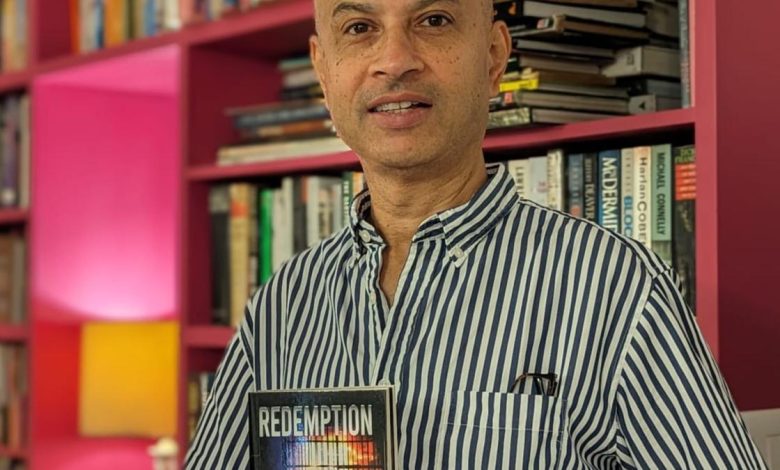Bengaluru-based author Harish Vasudevan talks about his debut novel ‘Redemption’
Redemption (Westland), Harish Vasudevan’s debut novel, navigates the murky waters of power dynamics and the repercussions of a single day that spirals into a nightmare for an ordinary family.

Redemption (Westland), Harish Vasudevan’s debut novel, navigates the murky waters of power dynamics and the repercussions of a single day that spirals into a nightmare for an ordinary family. The novel is set in 2007 in Bengaluru, a city at the cusp of technological revolution and societal shifts. It promises to take readers on a journey of crime and retribution.
On the path to becoming a novelist, Harish, who’s based in Cooke Town, Bengaluru, navigated the transition with a perspective shaped by a career in marketing, where storytelling forms the core of connecting with audiences. “My interest in mystery and thriller genres, fuelled by admiration for authors such as Robert Parker and Raymond Chandler, has always been a part of me,” Harish explains the genesis of his literary venture. The inception of Redemption finds its roots in personal strife and societal injustices, particularly influenced by his daughter’s encounter with bullying and the disconcerting response from those in authority.
Harish’s narrative is not merely a product of imagination but a reflection of the troubling realities of the misuse of power and legal failings in India. “The turning point came with a series of alarming incidents in India that caught my attention,” he recounts, drawing upon real-life events that underscore a disturbing pattern of power abuse. Through Redemption, he has channeled his frustrations and concerns into a storyline that spotlights the resilience of an ordinary family ensnared in extraordinary circumstances, advocating for a narrative where justice seeks to reclaim its lost ground.
The journey of crafting Redemption presented Harish with various challenges, particularly in character development and narrative expansion. “Going through the complexities of character development was my most formidable challenge,” he admits, underscoring the transition from dealing with data and facts to navigating the nuanced domain of emotions and character arcs.
Harish’s foray into character creation demanded a departure from his comfort zone, necessitating a deep dive into the intricacies of human emotion and societal dynamics to breathe life into the inhabitants of his fictional world.
Moreover, his transition from the succinct and impactful realm of blogging to the expansive and immersive world of a novel marked a significant shift in his creative process. “Crafting a novel, a vastly different endeavor required a significant shift in approach,” he explains, highlighting the challenge of sustaining reader engagement across the sprawling landscape of a novel. This shift demanded mastery over narrative progression, ensuring that each chapter not only contributed to the story’s forward momentum but also encapsulated enough intrigue to keep the reader engaged.
Choosing 2007 as the novel’s setting was a deliberate decision by Harish, aiming to capture a critical moment in the evolution of mobile technology and its societal implications. “The protagonist, a mother seeking vengeance for a heinous crime committed against her daughter, leverages her expertise as a mobile phone developer,” he explains, situating the narrative at the dawn of the smartphone era. This temporal setting is not merely a backdrop but a pivotal element that shapes the protagonist’s journey, underlining her connection to the burgeoning world of mobile technology and its role in her quest for justice.
At its core, Redemption, Harish reckons, is a testament to the human spirit’s capacity for resilience and the pursuit of justice in the face of daunting odds. He aspires to imbue his readers with a sense of hope, crafting a narrative that resonates with the triumphs and trials of navigating a world marred by inequality and injustice.
“In my story, I wanted to present a narrative where, despite the darkest of times, there’s a light at the end of the tunnel,” he says. “The protagonist is a figure of simplicity and routine. A devout woman, who cooks for her family, and embodies the everyday middle-class housewife, is thrust into an unfathomable crisis. She faces a disaster so severe that it lands her in jail, accused of a crime she didn’t commit, transforming her overnight from an ordinary person into a suspect.”
With novels aplenty being adapted to films and series lately, did Harish also think of adapting his story for the screen?
“I never thought of my book as potential movie material. But two or three readers suggested it should be adapted into a film,” he says, “I recognize the story has a movie-like quality to it, with a clear, linear progression where the good triumphs and the bad are punished, reflecting the classic narrative arc of many films. But it’s not about the suspense of discovering who the villain or the heroes are; that becomes apparent early on. In my view, the real mystery is observing how a devout, god-fearing person manages to navigate and overcome the challenges thrown their way. That’s the aspect I find most intriguing.”




